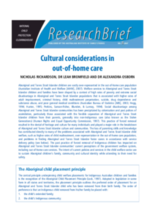Abstract
Aboriginal and Torres Strait Islander children are vastly over-represented in the out-of-home care population (Australian Institute of Health and Welfare [AIHW], 2007). Welfare services to Aboriginal and Torres Strait Islander children and families have been shaped by a context of extreme poverty and social disadvantage in Aboriginal and Torres Strait Islander populations that is associated with higher rates of adult imprisonment, criminal history, child maltreatment perpetration, suicide, drug dependence and substance abuse, and poor general medical conditions (Australian Bureau of Statistics [ABS], 2003; Hogg, 1994; Hunter, 1995; Perkins, Sanson-Fisher, Blunden, & Lunnay, 1994). Social disadvantage among Aboriginal and Torres Strait Islander communities has been precipitated by colonisation and past polices of assimilation, particularly those associated with the forcible separation of Aboriginal and Torres Strait Islander children from their parents, generally into non-Indigenous care (also known as the Stolen Generations) (Human Rights and Equal Opportunity Commission, 1997). This practice of forced removal resulted in the denial of heritage and culture for many individuals and played a major role in the breakdown of Aboriginal and Torres Strait Islander culture and communities. The loss of parenting skills and knowledge has contributed directly to many of the problems associate with Aboriginal and Torres Strait Islander child welfare, such as higher rates of child maltreatment, over-representation in the out-of-home care population, and problems in finding Aboriginal and Torres Strait Islander foster carers in accordance with service delivery policy (see below). The past practice of forced removal of Indigenous children has impacted on Aboriginal and Torres Strait Islander communities' current perceptions of the government welfare system, including out-of-home care services. The intent of current policies and services in the child welfare sector are to sustain family, community and cultural identity.

